By Harsh V Pant & Shairee Malhotra, respectively vice president, studies and foreign policy, & deputy director, strategic studies programme, Observer Research Foundation
On October 8-9, UK Prime Minister Keir Starmer concluded his first visit to India as a follow-up to Prime Minister Narendra Modi’s visit to the UK in July. The focus was on four key sectors aimed at strengthening the bilateral India-UK partnership—trade and investment, education, technology and innovation, and defence and security.
In the aftermath of the conclusion of the UK-India Comprehensive Economic and Trade Agreement (CETA) that is expected to double bilateral trade from the current £42 billion, it was natural for trade and investment to be at the heart of Starmer’s trip to India. He fittingly chose the city of Mumbai, India’s business and financial capital, bringing with him a massive delegation of 125 CEOs, and academia and cultural leaders.
The fact that this was the UK’s largest official business delegation since former Prime Minister Theresa May’s visit to China in 2018 was a clear indication that despite US President Donald Trump’s insinuations of a dead Indian economy, Britain views India as a place to do business. The ratification of the CETA, which will reduce tariffs and enhance market access and trade opportunities, may take some time. Yet, according to the British government, despite awaiting implementation the deal has already resulted in investment worth £1 billion in the UK and the creation of 7,000 jobs.
Defence cooperation, which has traditionally lagged with the UK accounting for only 3% of India’s defence acquisitions in the past decade, has become a priority. This was underlined in the UK-India Vision 2035 document, particularly as India aims to diversify its arms dependence away from Russia and modernise its capabilities, and Britain ramps up its defence sector and exports. In this context, the two sides signed a £350-million contract for the UK to supply lightweight missiles to India.
Parallel to Starmer’s visit, the two countries conducted their bilateral Konkan naval exercise in the Western Indian Ocean, indicating that despite the UK’s more imminent focus on the Ukraine war, the Indo-Pacific tilt ideated by the Tories seems here to stay. A new India-UK Regional Maritime Security Centre of Excellence is being planned under the Indo-Pacific Oceans Initiative (IPOI) alongside an agreement to power Indian warships with maritime electric propulsion systems to boost maritime cooperation.
Under the aegis of the Technology Security Initiative, the two countries unveiled initiatives including a climate technology start-up fund, a joint centre for AI, and a critical minerals industry guild to boost supply chains and green technologies. Meanwhile, nine British universities will be setting up campuses in India taking advantage of provisions under India’s National Education Policy and expanding the bilateral education partnership. The expansion of British universities to India is expected to deliver a £50-million boost to the UK economy (still a lot less than revenues generated from Indian students going to the UK) while catering to the demands of India’s growing student population. (It is estimated that India will need 70 million places for university students by 2035).
The joint statement yielded substantial references to counter-terrorism cooperation and information-sharing with a strong condemnation of the Pahalgam terrorist attack in April. By emphasising India’s inclusion as a member of the United Nations Security Council, Starmer seemed to hit the right chords. The icing on the cake was the announcement that three Bollywood films would soon be filmed in the UK.
Amidst all the pomp and splendour surrounding his visit to India, Starmer’s domestic ratings remain abysmal and he faces a serious political challenge from Reform UK’s Nigel Farage. Closer economic cooperation with India complements the need to boost economic growth, deliver on job creation, and help revive a sluggish British economy battling inflation, high energy prices, and a budget hole of an estimated £30-40 billion. How the UK will address labour shortages while restricting workers from overseas, against the backdrop of an intense anti-immigration sentiment clearly on display during far-right activist Tommy Robinson’s rally in September, remains to be seen.
While the UK has managed Trump relatively well so far through flattery and other tactics, India’s relations with Washington remain strained over Trump’s imposition of 50% tariffs on Indian imports, lending greater incentive to deepen ties with more reliable partners. Yet for all the rhetoric about the two countries being “natural partners”, the India-UK partnership isn’t without its irritants.
Starmer has clarified that he doesn’t intend to relax visa rules for Indian workers, instead increasing the number of years required for foreign nationals to claim the indefinite leave to remain status in the UK. While India’s ties with Russia have not caused significant friction despite the UK’s active support to Ukraine, India’s oil purchases from Russia are under greater scrutiny these days in Western capitals. Meanwhile, the Khalistan and Kashmir issues tend to surface time and again. Trade barriers such as government procurement issues and rules of origin still need attention, and the Bilateral Investment Treaty aimed at ensuring investor protections and better dispute resolution is still under negotiation. The two countries also need to resolve differences on the UK’s Carbon Border Adjustment Mechanism that is due to go into effect in January 2027 and likely to impact carbon-intensive Indian imports.
Despite these challenges, it is promising that the relationship is now being compartmentalised more effectively and evolving from concerns that have held it hostage in the past in favour of greater economic and strategic cooperation. Starmer reiterated his country’s intent to become a key partner in India’s journey towards a Viksit Bharat by 2047. Can cooperation between the world’s fourth- and sixth-largest economies serve as a pillar of stability in an era of instability? Ultimately, for all its pledges, the success of the India-UK partnership will hinge on London and Delhi’s abilities to deliver and implement the various initiatives that are agreed upon.


